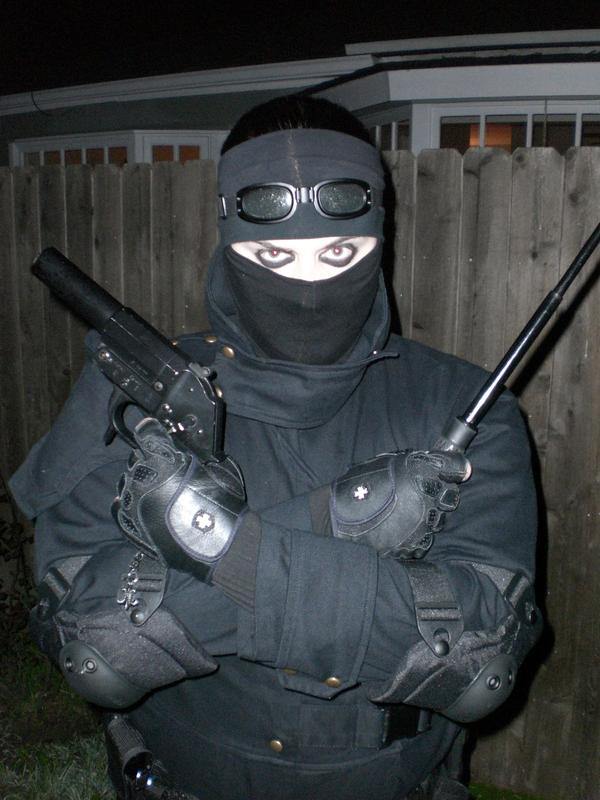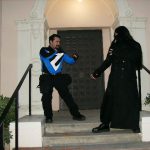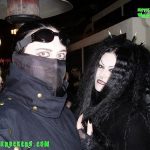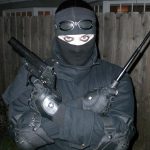 It’s a tough job being Portland’s only superhero.
It’s a tough job being Portland’s only superhero.
Once a week for the past 18 months, Zetaman has donned his costume and patrolled downtown Portland, seeking out the needy with gifts of food and clothing.
He goes armed with an extendable steel baton, pepper spray, and a Taser that delivers 30,000 volts—enough to put a man on the ground. Those tools of the trade are to defend himself or people in trouble. But he doesn’t pick fights, and so far he hasn’t been forced to draw his weapons or apprehend anybody.
Like the men under the Burnside Bridge one recent Saturday night when temperatures fell into the low 40s, most of the people Zetaman encounters are grateful for the help.
But they also fail to ask the obvious question: What possesses a stocky 29-year-old to put on a homemade costume and prowl the city streets in the dead of night?
The answers lie both in Zetaman’s own past and on the Web, where in recent years hundreds of other self-styled “real-life superheroes” have sprung into existence around the country.
Zetaman was hesitant to reveal his secrets when contacted by WW. But in the end he agreed to be interviewed and allow a reporter to spend two nights on patrol with him, in hopes that the publicity will inspire more people to become costumed heroes.
“This is not about me,” he insists. “Anyone could do this. I’m nothing special.” He doesn’t even like the term “superhero,” preferring to call himself a “man of mystery.”
But he admits being a costumed avenger is addictive after the first taste of parading in public with a “Z” on your chest.
“I couldn’t stop after that,” he says. “I feel great about myself. I’m staying active in the community. And I like comic books, I like great and noble ideas—like He-Man and Spider-Man. And they all have this thing about noble responsibility.”
On the pages of MySpace.com and in Internet chat rooms, the superheroes plan missions and exchange tips on fighting crime. That is, when they’re not sniping at each other, forming rival superteams, or weathering real-life attacks from mysterious supervillains. But more on the rivalries later.
Most heroes say they’re in the business to make a positive impact. Or just to have a good time.
“People will tell you they had a calling or a vision,” says “Superhero,” a 39-year-old former pro wrestler from Clearwater, Fla., who patrols his hometown in a souped-up ’75 Corvette. “I used to tell people I was trying to be a symbol. Then I realized it was a bunch of crap, and I do it ’cause it’s hella fun.”
In a world where sci-fi has come true and flip phones are as commonplace as pencils, the Eye, a 49-year-old superhero in Mountain View, Calif., says there’s nothing left to stop people from living out their comic-book fantasies.
“Every citizen should do something of that nature,” says the Eye, who says he uses his skills as a former private eye to solve crimes. “I just use the persona to protect the identity and do it with a little style, I suppose.”
It’s easy for the casual observer to wonder what the hell Zetaman or any superhero is accomplishing when the country is dealing with serious issues like the fifth anniversary of the start of the war in Iraq or the threat of a recession. And it’s just as easy to laugh at any superhero’s MySpace page, Zetaman’s included.
If you went online right now and accused him of being a supergeek, you certainly wouldn’t be the first.
But consider this: If our life is basically a quest for identity and purpose, real-life superheroes have a huge advantage on ordinary mortals. And for that, they credit the Internet—a world where users can instantly create new personas and seek out others with the same interests.
Dr. Gordon Nagayama Hall, a University of Oregon psychology professor, says real-life superheroes probably have an inflated sense of self-worth, even as they help the innocent.
“Some of us might do those things without the costume,” he says. “The sort of bizarre nature of it suggests to me they might be looking for some kind of recognition that might stem from some narcissistic process.”
The Web merely feeds that impulse, he says. “These Internet groups create this support that actually emboldens people to go out there and act out their fantasy.”
Or as Zetaman puts it, in less academic terms: “It’s a pretty easy club to join. All you need is a costume and a MySpace page.”
It’s taboo in the superhero world to call them by their real names. But by day, Zetaman is Illya King, a married man with no kids. He makes about $40,000 a year, lives in a two-bedroom apartment in Beaverton, drives a 1998 Ford minivan with 96,000 miles on it, and has no criminal record.
Zetaman declined to reveal where he works or what he does for a living, because, he says, he’s concerned about strangers showing up and harassing him on the job.
His stated motives for being a superhero range from the quotidian (“having a cool costume, having a cool identity”) to the quixotic (“helping as many people as I can as selflessly as I can”).
He hesitated to reveal his name for this story because, he says, his true identity is inconsequential. He insists he doesn’t want to draw attention to himself, but to serve as an example. And there’s another, more pressing reason Zetaman hesitates to identify himself: an alarming incident last month in California.
In an unprecedented turn, Zetaman’s superhero buddy Ragensi, who patrols the town of Huntington Beach, Calif., in a black ninja costume, says he was attacked by what appeared to be an unknown supervillain.
Nothing is known of the attacker, Zetaman says, except that he wore special pads used by other superheroes and seemed to be well-prepared, lurking in wait. He used martial-arts moves against Ragensi, who managed to escape using his own fighting skills.
Ragensi did not respond to WW’s requests for an interview. But Zetaman says the unprovoked attack made him redouble his reluctance to identify himself. “We’re still pretty freaked out by the whole thing,” Zetaman says.
Crazy as it may sound to the rest of us, the superhero community has long feared the possibility that supervillains may emerge to confront them. But even after Ragensi’s run-in, Zetaman says it never occurred to him that he could be a target. His costume is more low-profile than Ragensi’s ninja garb, and on the nights WW patrolled with Zetaman, he drew no stares on the streets of downtown. Even the people he helps rarely realize he’s a superhero.
Zetaman’s origins date back to 2006, a time when he was going through a rough stretch in his personal life. Both he and his wife had temporarily lost their jobs, and at the same time they were hit with thousands of dollars in medical bills when his wife suffered a miscarriage. As the couple sank into debt, collection agencies turned nasty, filing claims against them in court for more than $5,000.
But the Portland megachurch they were attending put more of an emphasis on money than other churches they had gone to, pushing the faithful to give at least 10 percent of their pre-tax income to receive the full blessings of God. The couple couldn’t put up that kind of cash. Friends began praying for them.
“We felt like we were charity cases,” Zetaman says. He made a vow. “I’m gonna find a way to make my name for something. I’m basically gonna stick it to the man. That’s how it started off.”
A comics fan since he was a kid growing up in California, Connecticut and Vancouver, Wash., he was tooling around online and found a website for Mr. Silent, an Indianapolis-based superhero. A search brought him to others, including Dark Guardian and Squeegeeman, both in New York.
(Squeegeeman is on the campy end of the superhero spectrum. His MySpace page claims he fights “crime and grime,” and shows videos of him participating in the 2007 AIDS Walk New York and giving out water during the city’s 100-degree heat wave last summer.)
Zetaman was impressed, but his search turned up no local superheroes. “I was kind of shocked that there was nothing like this in Portland,” Zetaman recalls. “Our motto is ‘Keep Portland Weird.’ Where’s all the weird people?”
He created a Yahoo account to establish a new identity online. He started working out, dropping 10 pounds on his 5-foot-6-inch frame, bringing him down to 200 pounds. And he hit the stores to buy his first costume: a spandex shirt from Wal-Mart, leather jeans from Hot Topic and boots from cryoflesh.com, a goth website. At Party City he bought a zebra mask and remodeled it to fit his first identity: the Cat.
He made his public debut on Aug. 18, 2006, when he planned to patrol while a movie was showing on Pioneer Square. He arrived at a downtown parking garage about 10 pm, donned his Cat mask and stood gazing out over the city, when a woman got off the elevator to walk to her car and started screaming. Two bicycle cops swooped in to question him.
“I thought, this is not cool. This is not gonna work at all,” he says. “I want to be a positive force, not some kind of a thug.”
Going against the advice of other heroes, he ditched the mask altogether and switched to Zetaman—a combination of Zorro and Superman, two of his favorite heroes, riffing off the Greek name for the letter Z.
Without the mask, he no longer incited public panic. But the costume remained a work in progress. He paid $70 for a full-length spandex costume from Minneapolis-based Hero Gear, which outfits many of the Internet’s real-life superheroes. But the full-body suit didn’t fly.
“It kind of sucked,” Zetaman says. “I wasn’t feeling it.”
A $45 spandex shirt with the stylized “Z” on the chest worked out better. But his leather pants brought unwanted attention from certain men on Southwest Stark Street, so he switched to cargo pants instead. He says that cut down on the catcalls.
He keeps his identity secret from everyone but a few family members. His parents are still in the dark. “Here I am, almost 30, and I still care about what my parents think,” he says. “I have an outfit, I run around in the middle of the night, and I hang out with homeless people. So yeah, I’ve kind of avoided that conversation.”
His wife of seven years, Allison King, 30, says at first she was apprehensive because she worried about his safety. But now she fully supports him. “He’s just my hero,” she says. “One of the things I fell in love with him for, he cares about other people so much.”
Now Allison accompanies him on patrol in civilian clothes, helping him pass out food and occasionally filming video she posts on YouTube. “It’s not how I thought I would be spending time with my husband,” she says. “But it’s awesome.”
Zetaman’s not into superhero kink, but he once slipped into bed in uniform. It didn’t work out. “It just felt too stupid,” he says. “I was just laughing.”
Vigilante justice has a controversial history, from Old West posses seeking revenge against Native American tribes to today’s Minuteman Civil Defense Corps patrolling the Mexican border. But the work of Zetaman and other superheroes appears to stay within the law.
Most states allow a citizen’s arrest if a crime is being committed. No permits are needed to carry Zetaman’s chosen weapons of batons, Mace or Tasers, at least in Portland. And while it may be eccentric to do community service in spandex, no one’s been arrested for impersonating a superhero.
A nationwide community-policing group called the Guardian Angels has existed legally for decades, including a local chapter that patrols the MAX line in Portland in their trademark red berets.
Though controversial with some critics, Guardian Angels leaders insist the group is a benefit to the public. Carrying no weapons, they travel in groups, concentrating on public places where people feel menaced. Zetaman and other heroes say their mission is little different.
“I certainly applaud him,” says Curtis Sliwa, who founded the Guardian Angels in New York in 1979. “He’s not getting paid for this. He’s risking his life, and he’s helping those who can’t help themselves.”
Cops take a different view of Zetaman.
“I think he’s going to get in big trouble,” says Sgt. Doug Justus of the Portland Police Bureau’s Drugs and Vice Division. “As soon as you start interfering with a crime in progress, if the guy doesn’t identify you as a police officer, I think you’re asking to get hurt.”
The upsurge in superhero activity across the country appears to have caused no complaints elsewhere. Even in Mountain View, Calif., where the Eye claims he uses light-emitting diodes to temporarily blind people while he’s solving crimes, local police spokeswoman Liz Wylie says cops there have never heard of him.
Zetaman says he’s only once stopped a crime in progress—honking his horn to scare off a guy trying to steal cars downtown. He’s lectured a few drug dealers, but unless there was a person in immediate danger, he says he’d be more likely to call the police on his cell phone than try to stop a crime himself.
“I guess it sounds kind of less heroic, but I don’t want to die,” he says. As for taking out gangs and other organized crime, he says he simply doesn’t have the time or the resources. “I wish I had a million dollars, like Batman,” he says. “But I’m just one guy out there. I’m not strong enough.”
In the past two years, superheroes say their numbers have exploded, largely due to MySpace, the social networking site that’s grown over the same time with its M.O. of allowing users to forge a fake identity and communicate with each other while remaining completely anonymous.
Hundreds of MySpace users pose as superheroes, but Zetaman—who’s intensely involved in the superheroes’ online community and set up several of their most popular bulletin boards—estimates fewer than 30 nationwide actually go out on patrol. As Zetaman suggests, the only requirements to be a superhero seem to be a costume and a nickname, though several also claim to have psychic powers.
Master Legend, a superhero from Winter Park, Fla., claims he can sense when people are in danger. He also says he has super strength and healing powers. And he’s not afraid to beat up bad guys like crack dealers, starting out by taunting them in his superhero costume.
“They just don’t know what to think of that. It shocks them,” he says. “They can’t help themselves any longer, and they come and attack me, and it’s showtime. And you can hear from me laughing how much I love it. I love to jump into action.”
Heroes in Florida and New York claim to have no trouble finding street crime, but Portland’s darkest alleys are a safety zone by comparison. Zetaman tried patrolling in the parks around Portland State University (don’t people get mugged in parks?). Still no dice.
His 70-plus nights on the street have led him to the conclusion that in Portland, the homeless are the real people in need. Now he wears a backpack stuffed with blankets, hats, gloves and socks to give away. He lugs bags of food and soda. One night last month he gave out five double cheeseburgers and five chicken sandwiches from McDonald’s, along with a 12-pack of Shasta cola.
Despite the fact that he’s still paying off his own debts, he says he spends about $100 a month out of his own pocket helping the homeless.
Besides giving out food, blankets and clothing, he also offers help getting to a shelter, or into a drug treatment program. But few accept the offer. “It sounds bad,” he says, “but people have to want help in order to get help. It took me a while to learn that.”
Zetaman’s do-gooder philosophy has taken heat from heroes who claim to take a more vigilante approach. His critics include Tothian, a New Jersey-based hero whose MySpace page says he “destroys evil.” Tothian told WW in an email that he once beat up seven armed men while on patrol.
The two heroes tangled on Internet chat boards last April after Tothian declared himself “leader” of the superhero community. But Tothian declined to criticize Zetaman in a WW interview. “Some things are not for the public eye or the media,” Tothian says.
Like many so-called online communities (see some of Oregon’s blogs on the political left and right as examples), legitimate differences and personal attacks have gradually eroded some of the group spirit that once united superheroes. Just like heroes and villains in comic books, they’re now divided into a number of opposing teams that occasionally come into open conflict online.
The conflict deepened when some heroes began calling openly for violence. “It’s pretty bizarre, the emoed-out kids that are more into the dark side of doing this,” Superhero says. Zetaman says he regrets his role in designing one of the message boards. “Now it’s more like this mini homeland-terrorism site, and it pisses me off,” he says.
After a tiff that Zetaman dismisses as “Internet drama,” Tothian kicked Zetaman off that bulletin board, known as Heroes Network. Zetaman in turn founded the Alternates, a group that includes the Eye and Ragensi. The three are holding a secret meeting in San Jose this May to get better organized, hoping to form a new West Coast superhero squad.
Zetaman also hopes to start up a Portland-based group. “I want to move on to where it’s not just me,” he says. “I think more people should pick up a comic book and say, you know, maybe I don’t have to be so gray all the time.”
While most of the online community refer to themselves as “real-life superheroes,” Zetaman says actual real-life superheroes are police, firefighters and other first responders.Zetaman broadcasts a superhero-themed live radio show online each Thursday night at midnight. You can hear it any time at blogtalkradio.com/thealternates.
Superbarrio, a real-life superhero in Mexico City, has gained fame since 1995 by organizing labor rallies and protests and filing petitions to stop government corruption.
Find real-life superheroes online:
en.wikipedia.org/wiki/Real-life_superhero
freewebs.com/heroesnetwork/
thealternates.org
myspace.com/zetamanofportland
myspace.com/masterlegend
myspace.com/ragensi
myspace.com/eyewatch_24_7
myspace.com/darkguardianhero
myspace.com/squeegeerific
myspace.com/tothian







 It’s a tough job being Portland’s only superhero.
It’s a tough job being Portland’s only superhero.